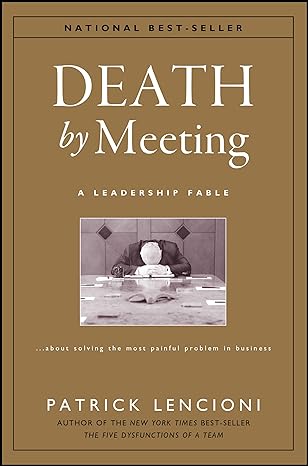
Death by Meeting: A Leadership Fable...About Solving the Most Painful Problem in Business - By Patrick M. Lencioni
Date read: 2017-01-24How strongly I recommend it: 9/10
(See my list of 150+ books, for more.)
Go to the Amazon page for details and reviews.
Great fable that teaches you the importance of the power of effective meetings. It goes beyond conventional wisdom and talks more to key concepts into having productive meetings.
Contents:
My Notes
Meetings are boring because they lack drama or conflict. To make meetings less boring, leaders must look for legitimate reasons to provoke and uncover relevant, constructive ideological conflict.
For a free download of this form and other related tools, please visit www.tablegroup.com.
Meetings are ineffective because they lack contextual structure.
When properly utilized, meetings are actually time savers.
Good meetings provide opportunities to improve execution by accelerating decision making and eliminating the need to revisit issues again and again.
We need to have multiple types of meetings, and clearly distinguish between the various purposes, formats, and timing of those meetings.
The key to injecting drama into a meeting lies in setting up the plot from the outset. Participants need to be jolted a little during the first ten minutes of a meeting, so that they understand and appreciate what is at stake.
Appealing to participants’ commitment to the larger mission of the organization, and its impact on clients, employees, or society at large. Employees aren’t expecting Hamlet, but they’re certainly looking for a reason to care.
A leader can minimize the discomfort and maximize the likelihood that conflict will continue by interrupting the participants and reminding them that what they are doing is good.
The single biggest structural problem facing leaders of meetings is the tendency to throw every type of issue that needs to be discussed into the same meeting, like a bad stew with too many random ingredient (aka Meeting Stew).
There should be different meetings for different purposes, and each of them serves a valid and important function.
Meeting #1: The Daily Check-In - requires that team members get together, standing up, for about five minutes every morning to report on their activities that day. Five minutes. Standing up. That’s it. If you socialize, ending the sessions after no more than ten minutes. If they’re going long because team members are trying to address issues every morning that should be discussed at the Weekly Tactical, this is a problem. What will ultimately happen is that people will get tired of having what feels like a daily staff meeting.
Commit to doing Daily Check-ins for a set period of time—perhaps two months—before evaluating whether or not they are working.
Meeting #2: The Weekly Tactical - focused exclusively on tactical issues of immediate concern.
A Weekly Tactical meeting should last between forty-five and ninety minutes, depending on its frequency, and should include a few critical elements, including the following:
During the Weekly Tactical, there are two overriding goals: resolution of issues and reinforcement of clarity. Obstacles need to be identified and removed, and everyone needs to be on the same page.
Meeting #3: The Monthly Strategic - schedule at least two hours per topic so that participants feel comfortable engaging in open-ended conversation and debate.
Strategic meetings occur regularly so that they can serve as a timely “parking lot” for critical strategic issues that come up during the Weekly Tactical meetings.
Ad Hoc Strategic Meetings - executives should create an ad hoc meeting specifically for the purpose of taking on that issue. It should be clearly separated from the Weekly Tactical so that executives can reset their minds to the nature of the meeting, and so enough time can be allotted for appropriate analysis and discussion.
A challenge in making strategic meetings work is the failure to do research and preparation ahead of time.
Ad Hoc Strategic meetings cannot be effective unless there is a willingness on the part of team members to engage in unfiltered, productive ideological debate.
Meeting #4: The Quarterly Off-Site Review - topics for reflection and discussion at a productive Quarterly Off-Site Review might include the following: